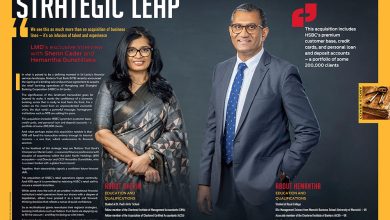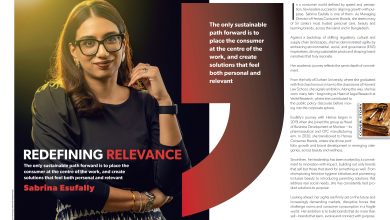COVER STORY
 SURVEY
SURVEY
METHODOLOGY
Great Place To Work® Institute is a pioneer in studying and recognising the best workplaces around the world. For over 30 years and in more than 57 countries, the Great Place to Work Institute has been conducting studies to understand and recognise the best workplaces.
Its study in Sri Lanka is based on the global model and a rigorous methodology that has been researched, tested and carried out in similar studies around the world – including in the Americas, Europe and Asia.
This model applies across all geographies, industries and company sizes, as it primarily measures the factors of trust, fairness and respect that are considered to be the foundations on which to create a ‘Great Workplace.’
THE INITIAL STEP The first step to being recognised as a great workplace is to undertake a paid assessment with a view to being certified and opting to participate in the ‘Best Workplaces’ study, which is a voluntary process.
While all organisations undertaking the Great Place to Work assessment have the opportunity to be certified now, participants who forward results to the Best Workplaces study and meet the global grades will additionally compete to be on the list of the ‘Best Workplaces in Sri Lanka’ each year.
To qualify for the Best Workplaces study, an organisation must have 20 or more employees, be a registered business in Sri Lanka for two or more years and not have been part of a merger or acquisition that changed the number of employees by over 25 percent in the year of assessment.

TWO-LENS MODEL The Great Place to Work model considers organisations from two perspectives: the employee perspective, whereby team members’ experience and engagement levels are evaluated by using the Trust Index© survey – i.e. to measure employee perceptions; and the manager’s perspective, to evaluate the culture of the organisation and practices established by management, for which the Culture Audit© tool is used to measure intent and quality of interaction with employees.
EMPLOYEE EXPERIENCE A unique employee-centric framework is adopted to measure the levels of trust, pride and camaraderie that prevail in an organisation through the Trust Index survey, which is a proprietary employee tool developed by the Great Place To Work Institute.
Comprising 56 statements and using a Likert scale, the universal instrument measures employee experience through the five dimensions of the Great Place to Work model. Another five statements – customised to Sri Lanka – have been included to capture the local context and other cultural nuances.
Administered in multiple modes – i.e. online, paper, pencil or kiosk depending on the company’s requirements – the survey is available in all three languages. A rigorous methodology for maintaining anonymity is followed so that individual responses cannot be tracked by organisations participating in the survey.
Through two open-ended statements, the tool also captures employee comments about what makes their workplace great and what would make it better. And it encourages employees to be open and candid in their anonymous responses.
All companies that participate in the study are evaluated and selected primarily on the basis of their employees’ responses to the Trust Index survey, which carries two-thirds of the weight in the overall score.
MANAGER PERSPECTIVES The manager’s perspective as well as practices established by management are measured by a proprietary tool and evaluation framework called the Culture Audit. This is a comprehensive questionnaire in which the company submits detailed material on the practices it has adopted, which are subject to rigorous evaluation.
The instrument helps gauge not only a company’s structure, demographics, compensation and benefits, but also its philosophy and values, and the manner in which they are woven into the organisation’s people practices. The remaining one-third of the overall score is derived from this Culture Audit.
PARTICIPATION For companies that employ between 50 and 200 people, all employees are selected to participate in the survey by default. And for those with over 200 employees, organisations have the choice of everyone participating or for a stratified sample of randomly selected staff members undertaking the Trust Index survey.
Sample selection is performed statistically by Great Place to Work systems. The eventual sample, which has a minimum confidence level of 80 percent, is dependent on the total number of employees from the full list of staff members working in the organisation.
EVALUATION To maintain the reliability and validity of the study, stringent audit processes are followed during and after the completion of the survey. In addition, communications by the organisation to its employees are templated and pre-approved to ensure that the authenticity of responses isn’t compromised. The Trust Index survey scores are tracked and an audit requirement is triggered whenever abnormal trends are observed in the employee survey scores. There have been instances of employee surveys being re-administered in a controlled environment if required – especially where the audit team has felt the need for further verification of employee survey data.
Moreover, as Great Place to Work uses the two-lens model that evaluates both employee perceptions and established practices, it can identify practices that may not be in effect, or are inaccurate or not implemented based on related employee feedback, which triggers a separate verification  and audit of the practice itself.
and audit of the practice itself.
There are also examples of companies that have been disqualified from the process or not considered for listing because they didn’t adhere to the standard survey process.
Maintaining and enhancing the rigour of the study is the topmost priority at the Great Place to Work Institute, which prides itself on upholding this process in all parts of the world in which it operates.
 IT’S SIMPLE.
IT’S SIMPLE.
IT’S TRUST.
Great Place to Work® outlines the key trends uncovered
in its study on the Best Workplaces in Sri Lanka for 2017
Kshanika Ratnayaka and Ruwani Alwishewa report on the
findings and what they mean for Sri Lankan corporates
Great Place to Work® is considered to be the global specialist in high-trust and performance workplace cultures. Through proprietary assessment tools and advisory services based on 30 years of research, Great Place to Work provides the model and benchmarking facility, as well as the guidance needed to build, sustain and recognise outstanding workplace cultures.
During this time, Great Place to Work has reached out to over 100 million employees, continuously validating what it means to be a great workplace. Sri Lanka is one of the 57 countries that contribute to this global study, which is the largest of its kind.
STUDY IN SUMMARY In its fifth consecutive year of the study in Sri Lanka, around 100 organisations were assessed across 16 sectors, representing an employee population of 31,000 for the year of which 18,800 employees were surveyed at an 81 percent response rate.
This has enabled Great Place to Work Sri Lanka to establish the 25 Best Workplaces for 2017.
The definition of a ‘Great Place to Work’ is simple. It is based on three key relationships that reflect employees’ trust in the people for whom they work and pride in what they do, and camaraderie among the people with whom they work.
When asked the question ‘taking everything into account, do you believe your organisation to be a Great Place to Work?,’ nine out of 10 employees in Sri Lanka’s 25 Best Workplaces said ‘yes.’

KEY DIMENSIONS The defining foundation of great workplaces is based on trust that is created through management’s credibility, the respect with which employees feel they are treated and the extent to which members of staff experience fairness in the organisation.
Taken together with the degree of pride and camaraderie among employees, these characterise the five key dimensions of a Great Pace to Work.
With an 86 percent positive response, pride is the top-scoring dimension as staff members of the Best Workplaces are proud of their culture and accomplishments. Fairness ranks lowest with a 79 percent positive response – it is the most sensitive dimension to manage as its perception is personal. This observation is not limited to Sri Lanka but seen across most parts of the world.
 LOCAL DRIVERS Using the results of this year’s study, Great Place to Work analysts have derived a set of key drivers that are the leading factors currently affecting the performance of Sri Lankan organisations as great workplaces.
LOCAL DRIVERS Using the results of this year’s study, Great Place to Work analysts have derived a set of key drivers that are the leading factors currently affecting the performance of Sri Lankan organisations as great workplaces.
THE ADVOCATES Enabling employees to take pride in one’s organisation and recommend it to others is the leading driver for Sri Lankan employees today – 92 percent of employees in Sri Lanka’s 25 Best Workplaces said they are proud of their workplace while 84 percent were positive about recommending their organisations.
Building a company’s brand is now in the hands of all its employees. Staff members are capable of building their employer’s reputation or tearing it down. Study data confirms that pride in team accomplishments, management integrity and team spirit are impactful areas linked to advocacy.
Great workplaces provide employees with opportunities to participate in the organisation in ways that create a sense of belonging and ownership, which in turn inspire employees to be advocates.
LONG-TERM ASSOCIATION This refers to facilitating employees to feel a long-term association with the organisation. In Sri Lanka’s 25 Best Workplaces, 84 percent of employees said they wanted to work in their organisations for a long time.
Having employees constantly change jobs causes the loss of experienced people and tacit knowledge, disrupts the workflow and talent pipeline, weakens team dynamics and increases rehiring costs. A great workplace culture engages and bonds employees through building trust over the long term, providing a sense of value and contribution.

PERFORMANCE EVALUATION Competence in delivering fair performance evaluations is the third key driver. As this is linked to increments and promotions in most organisations, it is an area in which all employees expect fair and justifiable treatment and recognition for their efforts.
Fair evaluations and meaningful recognition of performance improves employee morale, which boosts productivity, retention and commitment – 79 percent of employees in Sri Lanka’s 25 Best Workplaces were positive about performance evaluations being fair.
 CAREER GROWTH OPPORTUNITIES The capacity for growth within the organisation is the next key driver. In this age of transparency, a rich supply of external job opportunities is available for viewing online, tempting employees to seek employment elsewhere. This underscores the necessity to communicate internal growth opportunities.
CAREER GROWTH OPPORTUNITIES The capacity for growth within the organisation is the next key driver. In this age of transparency, a rich supply of external job opportunities is available for viewing online, tempting employees to seek employment elsewhere. This underscores the necessity to communicate internal growth opportunities.
Sri Lanka’s 25 Best Workplaces invest substantially in training programmes, offering 70 hours of training annually on average for employees of the largest occupational group. Of those hours, 67 percent is devoted to employees’ current roles while 33 percent focusses on growth and development.
Great workplaces also enhance programmes that support a road map for all employees to manage their professional development and career path.
ATTRACTING THE RIGHT TALENT This is the ability for employees to see and feel their organisation attracting the right talent. Attracting the wrong people can be one of the largest costs to a company when such employees cannot produce quality work or work well with others.
Talent that is skilled and fits in a cultural sense must be attracted. Great people want to work with other great people. Maintaining a strong company culture and employer brand image broadens the applicant pool, allowing an organisation to raise the bar in talent selection.
Employees should be utilised as talent scouts and referrals for hiring – 33 percent of new hires in Sri Lanka’s 25 Best Workplaces used employee referrals last year.
 AREAS FOR IMPROVEMENT The area of lowest positive perception among employees in all the organisations measured through the study in Sri Lanka is that of a fair profit share with only 58 percent expressing positivity. Other low-scoring areas were managers avoiding favouritism (58%), fair promotions (63%), fair pay (64%), managers keeping promises (67%) and workplace politicking (68%).
AREAS FOR IMPROVEMENT The area of lowest positive perception among employees in all the organisations measured through the study in Sri Lanka is that of a fair profit share with only 58 percent expressing positivity. Other low-scoring areas were managers avoiding favouritism (58%), fair promotions (63%), fair pay (64%), managers keeping promises (67%) and workplace politicking (68%).
SIZE OF THE ORGANISATION Study results indicate that a variation between organisations is minimal in terms of size based on the number of employees. The topmost areas of strength and improvement mentioned above are common among the size categories that also follow the national trend.
But medium-size organisations score marginally lower. This may be due to the struggle that they face when transitioning from small to medium or medium to large, shifting from a relatively unstructured set of norms in relatively flat organisations to establishing more structured practices and hierarchies to which employees adhere.
This highlights the vital role that culture and trust play in times of growth and change. Organisations that are in a state of cultural shift must make it a priority to measure and take action in maintaining levels of trust.


 MEET THE PEOPLE MANAGER Cultivating a great workplace culture requires the buy in and efforts of people managers. An employee’s experience is the sum of interactions with their manager. So it’s vital for managers to consider the quality of their relationship with employees and take action to improve their people management skills.
MEET THE PEOPLE MANAGER Cultivating a great workplace culture requires the buy in and efforts of people managers. An employee’s experience is the sum of interactions with their manager. So it’s vital for managers to consider the quality of their relationship with employees and take action to improve their people management skills.
A subsect of the Trust Index© survey has been specially designed to measure people management skills in managers.
The overall study data highlighted that Sri Lankan managers are positively perceived to be approachable (81%), democratic in the treatment of employees (80%), and honest and ethical in business (79%).
On the other hand, managers avoiding favouritism (58%), being fair in promotions (63%) and ensuring that their actions match their words (66%) are perceived as critical areas for improvement.
Managers of Sri Lanka’s 25 Best Workplaces maintain scores of 10 points higher on average while other workplaces are about 10 points below the national average in the context of positive perceptions.
 BEST VS. THE REST Sri Lanka’s 25 Best Workplaces (89%) are ahead of the rest (69%) by 20 points in terms of employees’ positive perceptions about their organisations being considered a ‘Great Workplace.’ The gap therefore, is significant.
BEST VS. THE REST Sri Lanka’s 25 Best Workplaces (89%) are ahead of the rest (69%) by 20 points in terms of employees’ positive perceptions about their organisations being considered a ‘Great Workplace.’ The gap therefore, is significant.
Study data uncovered the five largest gaps in employee perceptions between the Best Workplaces and the rest. As demonstrated by the levels of perception, most of these areas represent core issues and are difficult to be consistently maintained at high levels of perception even for great workplaces across the world. They can be used to separate the average from the great.
Sri Lanka’s 25 Best Workplaces also struggle with the same areas that score lowest nationally. Impartiality – i.e. people avoiding politicking and manager favouritism/fair promotions – is one of the most difficult areas to deal with.
But the 25 Best Workplaces are ahead of the rest by 15 percentage points in this area due to the robust processes that are established to deliver justice. It is not that the Best Workplaces don’t have value violations; what sets them apart is what they do in such times. They almost always do the right thing.
Such difficult areas necessitate continuous determined efforts to make a difference. Creating a great workplace cannot be achieved overnight; it is a commitment to the journey of continuous improvement.
The legends who have been listed for 20 years in a row among Fortune’s 100 Best Companies to Work For 2017 bear testimony to this – they demonstrate significant improvements today in even the lowest-scoring statements of the assessment of impartiality.
 Sri Lanka has begun a similar journey. Witnessing a positive trend in results for the past five years in the lowest-scoring statements offers hope that the country is on its way forward.
Sri Lanka has begun a similar journey. Witnessing a positive trend in results for the past five years in the lowest-scoring statements offers hope that the country is on its way forward.
By surveying millions of employees and studying thousands of businesses, Great Place to Work has established a model for building performance that’s based on trust. It is a contribution to a global shift in businesses that’s changing the way the world works.
The Best Workplaces improve mostly because their leaders view a high-trust culture as an absolute business imperative in today’s market. Therefore, they serve as the vanguards of the movement towards better workplace cultures.
 Great Place to Work’s mission is to build a better world by helping organisations become Great Places to Work for all. Employers that develop everyone’s full human potential are better for business, for people and for the world.
Great Place to Work’s mission is to build a better world by helping organisations become Great Places to Work for all. Employers that develop everyone’s full human potential are better for business, for people and for the world.
Wherever you are on your journey, you’re invited to join us and create yours too – because some employees will work for your cause and many will work for the pay but most employees will work for trust!
For more information on how to begin your journey in creating a Great Place to Work, contact lk_greatplace@greatplacetowork.com (or visit www.greatplacetowork.lk).
Kshanika Ratnayaka is the CEO of Great Place To Work® Sri Lanka (she can be reached at Kshanika.Ratnayaka@greatplacetowork.com).
Ruwani Alwishewa is the Best Workplaces List Manager of Great Place To Work® Sri Lanka (she can be reached at ruwani.alwishewa@greatplacetowork.com).
CATEGORY AWARDS
Every year, Great Place To Work® category awards recognise organisations in the Best Workplaces list that demonstrate excellence in specific areas of people management that uphold a great workplace culture.
Organisations that are best in class in the 2017 study in the country are felicitated by way of four main categories: Excellence in People Initiatives (three selected practices), Cube Award for Special Recognition (two selected areas), Organisation Size and Classification, and Laureates (organisations listed for five years in a row).

EXCELLENCE IN PEOPLE INITIATIVES
The Great Place To Work Institute creates awareness on best practices that support the building and sustaining of great workplaces.
When finalising the front-runners for these categories, both people practices (two-thirds of the final score) as well as their respective employee perception scores (a third of the final score) were scrutinised, with organisations having both robust and impactful initiatives being selected.
The three practice areas that are selected for awards this year are deemed to be of high significance for organisations functioning in modern-day Sri Lanka.
EXCELLENCE IN TRAINING AND DEVELOPMENT
Develop people to be their best and do their best as an investment made in people is good for them, for business and ultimately for customers.
Great employers realise that the workplace presents opportunities for genuine fulfilment and everyone wants to be their ‘best self.’ Development in great workplaces goes well beyond formal training and skills development, focussing on learning and growth; it allows people to find where they fit, do the type of work they enjoy and where their unique contribution – both personal and professional – can be appreciated.
Likewise, a lack of opportunity for development and progression is one of the main contributory factors of high levels of employee turnover in average companies.
An organisation must incorporate structured development interventions that offer new opportunities to those who aspire to build a career and groom them to reach their full potential. But such programmes must encourage employees to be accountable for their development, supported by the employee’s immediate manager and the organisation.
EXCELLENCE IN TWO-WAY COMMUNICATION
Good communication invites two-way dialogue.
Great workplaces go to great lengths to be clear, open and transparent, offering access to information across the board with managers being accessible, creating opportunities to begin conversations and encouraging employees to contribute beyond the scope of a narrowly defined job.
Special open systems to capture employee feedback for incorporating people’s ideas and including staff members in decision-making are established.
It goes without saying that employees are spokespeople for their organisations. The more they’re informed, the better they can represent the company in the community. Internal communications do not need to be extensive to be useful. The important factor appears to be a continuous flow of information even if it’s about a simple ‘work in progress’ as employees appreciate being in the loop.
Research clearly indicates that the development of an internal communication strategy and its implementation can provide a number of benefits to organisations such as higher motivation and engagement, and better team relations, as well as enhanced performance and productivity among employees.
EXCELLENCE IN EMPLOYEE RECOGNITION
Great workplaces understand that everyone likes to be recognised and appreciated – this is a key driver of employee retention and continuous value addition to the organisation.
But recognition is not synonymous with incentives. There is a large body of evidence to indicate that direct incentives only work for non-cognitive repetitive work. Inspired workplaces cultivate a ‘culture of appreciation’ in which employees are regularly rewarded for good work and extra effort, and characterised by a wide variety of recognition programmes and ways in which the company displays its appreciation of employees.
Great workplaces attempt to make the workplace a space in which employees want to be. So they use employee-recognition as an avenue to create opportunities for fun and social connections. But it’s important that an employee’s accomplishments are recognised for the right reasons in an appropriate and timely manner. Suitable acknowledgement should be offered to each individual as well as the team.
CUBE AWARD FOR SPECIAL RECOGNITION
PRIDE IN THE ORGANISATION
Pride is a core dimension of a great workplace, capturing how employees feel about their personal job and the team, and the organisation’s public image. High levels of pride in these areas favourably affect employees’ engagement in their jobs, thereby increasing productivity, teamwork and commitment.
Pride in their personal job is developed through sensing that specific individual contributions are significant to the organisation – i.e. that every staff member makes a difference. This feeling of pride can lead to employees making long-term commitments to the organisation.
People’s pride in team accomplishments is both a reflection of good teamwork, and the explicit recognition by management that the success of the organisation often comes from collective team effort and not only from individual contributions.
Finally, people’s pride in being associated with the organisation comes from the firm’s reputation within its industry, and its ability to meet clients’ needs and a commitment of service to the communities in which it is located.
BEST WELLNESS PROGRAMME
There is growing awareness of the impact wellbeing can have on individuals, businesses, the economy and society. Wellbeing includes people’s physical and mental health, and the social and relationship aspects of their work environment.
It is a key driver of engagement and is strongly linked to an employee’s intention to stay in or leave the job, as well as organisational performance. For many ‘employers of choice,’ focussing on employees’ wellbeing is a conscious business decision.
Best Workplaces achieve high levels of wellbeing through three elements of the employee ‘deal’ or contract: a value-driven culture in which people feel trusted and respected, wellness benefits and programmes, and the physical work environment.
Great wellness programmes offer support to all employees in many ways. Family-related benefits such as job-protected leave, and maternity or paternity leave, and childcare benefits as well as facilities like fitness programmes and health plans support wellbeing. Moreover, funeral expense funds, medical insurance, loan schemes and so on are notable provisions too.
CATEGORY AWARDS BY ORGANISATIONAL SIZE AND CLASSIFICATION
ORGANISATIONAL SIZE (EMPLOYEE STRENGTH)
The complexities and challenges of maintaining a great workplace culture vary with the size of the employee population. So organisations that are ranked among the leading three best-in-class in their respective employee-strength category (Small Organisation, Medium Organisation and Large Organisation) are felicitated.
ORGANISATION CLASSIFICATION
This includes the top multinational corporation (MNC) and public limited corporation (PLC) in Sri Lanka. The leading MNC in Sri Lanka as well as the top-ranking PLC have been selected on the basis of the highest combined score in terms of employee perception through the Trust Index© survey and people practices with the Culture Audit©.
LAUREATE STATUS
Staying great means that engagement is clearly not a one-off exercise. It takes continued focus and effort to keep it alive, as well as sustain a culture that makes organisations who they are.
So organisations that have demonstrated proven commitment to employee engagement and people management by gaining a place in the list for five consecutive years are recognised as Laureates among the Best Workplaces.
Winners in each category will be announced at the Great Place To Work® Sri Lanka Awards Ceremony this month.








